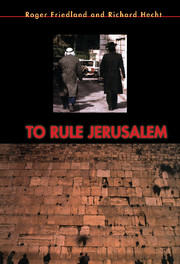Book contents
- Frontmatter
- Contents
- List of Illustrations
- Preface
- Acknowledgments
- Introduction
- 1 A Fearful Fusion
- Part I The Two Zions: Jews Against Zionism in Jerusalem
- 2 Zion Against Zionism
- 3 Black Zion
- 4 Sabbath Wars
- 5 To Control the Center
- Part II Zion Divine: Jerusalem as the Messianic Central City
- Part III Birth of a Nation
- Part IV Heart of Stone
- Notes
- Index
2 - Zion Against Zionism
Published online by Cambridge University Press: 13 May 2010
- Frontmatter
- Contents
- List of Illustrations
- Preface
- Acknowledgments
- Introduction
- 1 A Fearful Fusion
- Part I The Two Zions: Jews Against Zionism in Jerusalem
- 2 Zion Against Zionism
- 3 Black Zion
- 4 Sabbath Wars
- 5 To Control the Center
- Part II Zion Divine: Jerusalem as the Messianic Central City
- Part III Birth of a Nation
- Part IV Heart of Stone
- Notes
- Index
Summary
It is ironic that Jerusalem lent its name to the Jewish nationalist movement, for Zionism was built largely outside Zion, in the countryside and along the coast. Theodor Herzl wanted to build the capital on Mount Carmel, not within Jerusalem. The city was filled, he wrote, with “musty deposits of two thousand years of inhumanity, intolerance and uncleanliness.” Poets and politicians – Bialik and Ben-Gurion, for example – avoided the city. Chaim Weizmann, Israel's first president, felt uncomfortable there and wanted to exclude the Old City in Britain's first partition plan. Jerusalem did not loom large in early Zionist imagery. In the early postcards celebrating Jewish settlement in Palestine, there are few images of Jerusalem.
The Zionists purchased little land in, or even around, the city. This was not because land was unavailable for purchase. Both the Greek Orthodox Patriarchate and the Catholic Church were acquiring property in Jerusalem. Prominent Arab families were also more than willing to sell to Jews, as their enemies repeatedly charged. When statehood came, Israel owned little in the city, not even a plot on which to build their new capital, which they constructed on expropriated Palestinian lands.
To grasp Zionist discomfort with Jerusalem, it must be understood that the religious Jews of Zion opposed Zionism with all their might. The city's devout Jews fought to defend Judaism's sacred center against the secular nationalists whom they understood as a profaning presence. Although many religious Jews have accommodated, and even embraced, the Jewish state, the relationship between Judaism and Zionism is still an uneasy one. And it remains most difficult in Zion itself.
- Type
- Chapter
- Information
- To Rule Jerusalem , pp. 49 - 67Publisher: Cambridge University PressPrint publication year: 1996

